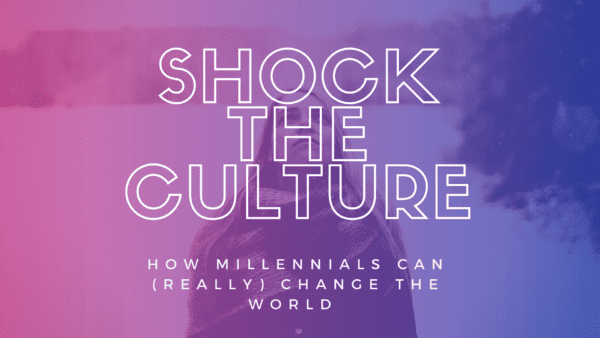We all have opinions, and often they are shaped from an experience we may have had at one time or another. The day-to-day life of a believer is no different. Whether we are at work, school, or running errands, we run into people who challenge religion, the church, or Jesus himself. There is even a former presidential candidate who stated that Christians should not hold positions of influence within government. As such it’s becoming more and more common to be openly hostile to Jesus and His church in our culture today.
Why is that? Why do people feel it is acceptable to marginalize any group? Isn’t it widely accepted that people shouldn’t be judged by which group they belong to? While we can complain about the perception the world has of us we need to ask ourselves whether their perspective is the reality?
We’ve heard all of the common complaints against the church. We’re selfish, hypocrites, or we think we’re better than everyone else. Where do they get these ideas? Wouldn’t it be much nicer if they used the fruits of kindness to describe us?
“But the fruit of the Spirit is love, joy, peace, forbearance, kindness, goodness, faithfulness, 23 gentlenesses and self-control. Against such things, there is no law. (Galatians 5:22-23, NIV).
Believers sit on a fence, and we have our hearts firmly planted in the faith while our feet are planted in our day-to-day activities. Is this just a public relations issue or is it systemic throughout the Western Church? Regardless, there is a disconnection in the way we perceive ourselves, and the world perceives us. It is as if the word “Christian” is synonymous with “Hypocrite” in our society.
In his book “The Way Back: How Christians Blew Our Credibility and How We Get It Back” Phil Cooke lays out a fairly compelling argument that it is not a public relations issue, however, a real issue with us. While writing this book, Cooke conducted some research into the churches behaviors.
70% – 80% of Americans classify as Christian, however, attendance at church weekly is 20% of that number. Cooke states that American Pastors claim that regular attendance at church is 3 out of 8 weeks according to most pastors (19 Sunday’s in one year!)
Of the 20% that attend a service, 63% say that prayer is essential (which means 37% don’t think prayer is essential)
Of the 20%, only 10% give 10% of their earnings as tithing
Cooke states that all of the things non-Christians say about us are true. It’s as if we’re the fat guy at the gym who is lecturing everyone on health.
Our churches focus on baptism, tithing, and attendance. All of which are at all-time lows. Did Jesus focus on those things? Shouldn’t we aim to be more like him? How did Jesus walk? He stood up for the weak, the oppressed, and the sick. He healed the broken and rose people from the dead. You still sad that Chick-fil-a is closed after church?
It is true, God has time for murders, adulterers, and other sinners, however, he does not have time for a believer who knows what to do and doesn’t do it.
The mission
“By this everyone will know that you are my disciples if you love one another.” (John 13:35, NIV)
The early church rose from nothing. No political power, money, education, or plans. How did the disciples go from being a fringe group to being the most influential forces in the world?
The disciples were committed. How many of us can say we’re even half committed to the great commission? They made a substantial impact on Roman culture by taking in the sick, outcast, and downtrodden. In Roman times infanticide was a major issue. People would dispose of their babies and wouldn’t even give their baby a name until they decided if they’d keep it. One of the major tactics the early church did was to take in these abandoned children. They created hospitals, orphanages, and universities. The Roman culture started to wonder who these people were and were drawn to the love they displayed.
Real world example
Going out of your way to help someone is a struggle with our busy lives today. However, I’d like to share with you a real story that we can all relate to.
Tara, a member of a local church reached out to the local church community for help through the ARISE app crowdservice tool. It is a tool that churches use to coordinate acts of kindness and to reach out to their local communities. Her mother (a believer who doesn’t really attend church) needed to move, and she didn’t have enough money to pay a moving company. She was just diagnosed with cancer and needed to move in with her other daughter. Within a matter of a day three people (all from different churches) said they’d help. The day was set and the move was happening.
Tara could not be there on moving day so her sister came. She is an atheist and was anti-church. She didn’t have luke-warm opinions, she had very warm opinions of the church and let’s just say they did not resemble Galatians 5:22-23.
The move went smooth and the van was packed up in no time. No one threw a bible in her face or tried to perform an exorcism on her. A few days later, Tara asked her sister how the move went and she was taken back that three random people would show up to help her mother like this. Tara said to her sister “you know that they were all Christians, right?” Tara’s sister reply was great, she said: “well, I like those Christians.”
Just a simple act of kindness can move mountains. Just imagine what would happen if we as a church reached out like this? We’re not saying we all need to become Mother Teresa, but if we actively took part in performing acts of kindness like this the perception of the church would change, just as it did in ancient Rome.
What are the ways we can shock the culture?

There are 450,000 kids in foster care system today. What a large number of kids, right? No, not when you realize that there are 350,000 churches in America. If one family in each church said they’d take one or two kids, the whole system would be wiped out in one year, then each year another family did it. If the church body supported the family thereafter to help care and love these kids, we would transform lives!
It’s called crowd-service. It’s when large amounts of people chip in random acts of kindness to make a huge impact for Christ. The ARISE app is built for this: to show the world God’s love and grace. This is how we can change the public relations issues that the world has of Jesus and grow deeper in our relationship with Him.
Would another orphanage, hospital, or school shock our culture? Probably not, but would a new technology that upended the very core of the social safety net in western civilization? Absolutely, we use technology for money transfers, taking pictures, and many other things, why not to show the love of Jesus?
When people are in need they should turn to the church, not the government. We are here to love them. The roadmap is here: we are to love our God and love our neighbor. Let’s take that and apply it to these modern times.
Next Steps
Download the ARISE app today and get started. Ministry programs are great, but you need to take ownership of your own faith and love your neighbor yourself. Your pastor can’t love God for you. Bring what you have and remember what Jesus did with the fish and bread when he fed the multitudes. Are we different than the rest of society? What do I want to be? A complacent person who goes to the Sunday morning social club or a navy seal for Jesus? If your church isn’t pushing you to be active in your faith, then you need to find another church.
Together we can shock the culture in the same way that they did in the first century. What’s stopping us? Read their manifesto to learn more about this mission.
Visit Us
Godinterest Community Fellowship is dedicated to proclaiming Christ and set apart to save and empower lives. Sign-up to receive inspiration to draw closer to God each day.
Our Location: Central London Community Church - Crawford Place, London, W1H 5JE
Regular Meetings Divine Service: Every Saturday from 11:15 AM
Godinterest is sponsored by Dean Jones of Jamaica Homes




Thanks, Kevin!
Wonderful concept. I will check it out